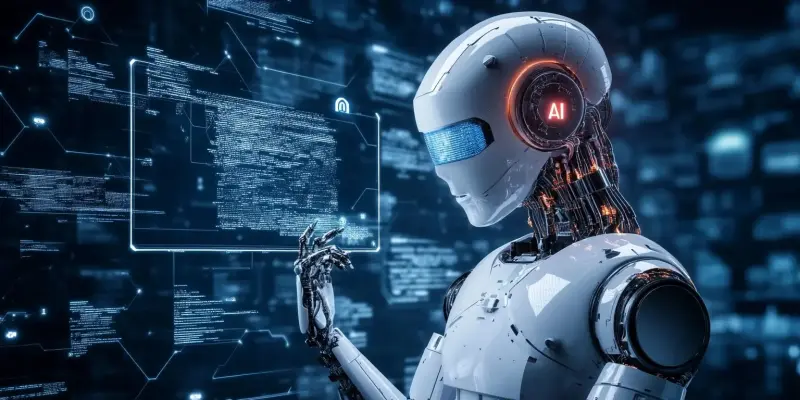The rapid advancement of AI agents is revolutionizing the automation landscape, offering unprecedented capabilities in autonomous decision-making and efficiency. These intelligent systems are poised to surpass traditional automation tools like Robotic Process Automation (RPA), fundamentally changing how businesses operate. Unlike RPA, which has long been the cornerstone of business automation by mimicking human actions to perform repetitive tasks, AI agents can think and act independently. This shift from mere task execution to autonomous decision-making marks a significant evolution in automation technology. Advanced AI models like ChatGPT and Claude exemplify this transition, offering enhanced reasoning and content generation capabilities, although they still rely on human input for more complex tasks. The ability of AI agents to operate autonomously without continuous human oversight revolutionizes efficiency across various sectors by eliminating bottlenecks and ensuring faster, more accurate decision-making processes.
The Evolution from RPA to AI Agents
Robotic Process Automation (RPA) systems have been instrumental in automating repetitive tasks by mimicking human actions. Despite their efficacy, RPA tools often struggle with unstructured data and complex workflows, leading to systems that can be brittle and require constant vendor intervention for maintenance and updates. These limitations have paved the way for the emergence of more sophisticated AI agents. AI agents, unlike traditional RPA systems, exhibit a higher degree of autonomy, allowing them to perform tasks independently and make decisions without continuous human oversight.
With their ability to think and act independently, AI agents mark a significant leap from the traditional RPA approach. They can analyze vast amounts of data, reason through complex scenarios, and generate content or solutions autonomously, offering businesses a more adaptable and efficient automation tool. For instance, advanced models like ChatGPT and Claude provide enhanced reasoning and sophisticated capabilities, although they may still require human input for certain nuanced tasks. Nevertheless, the overall shift from task execution to autonomous decision-making represents a crucial evolution in automation, promising to deliver more resilient and cost-effective solutions for businesses across various industries.
The Rise of Vertical AI Agents
One of the most noteworthy developments in the AI landscape is the emergence of vertical AI agents—specialized systems designed for specific industries or use cases. These vertical AI agents are proactive, capable of making suggestions and executing workflows autonomously. This specialization allows them to handle dynamic and fast-changing environments more effectively than their more generalized counterparts, eliminating the need for large operational teams.
In the healthcare industry, AI agents already manage patient data, schedule appointments, and assist in diagnostics, significantly improving efficiency and accuracy. Moreover, in the finance sector, these agents can analyze market trends, manage portfolios, and execute trades autonomously, providing a competitive edge to businesses. The adaptability of vertical AI agents means they can respond to real-time changes, reimagining workflows, and introducing unprecedented capabilities. This proactive approach not only optimizes routine operations but also allows industries to leverage advanced AI for innovation, ultimately transforming the way businesses function.
Projected Growth and Adoption of AI Agents
Experts predict a substantial shift in the adoption of AI agents in the coming years, driven by their unmatched capabilities and the rising need for efficiency in enterprise operations. Projections indicate that by 2028, 33% of enterprise software applications will incorporate agentic AI, a significant increase from less than 1% in 2024. This transition marks a considerable evolutionary leap from RPA to multi-agent AI systems, which are capable of autonomous decision-making and collaborative workflows, fundamentally altering the way enterprises operate.
The expected integration of AI agents into enterprise software is set to revolutionize daily operations by handling a substantial portion of decision-making tasks. By 2028, it is anticipated that AI systems will autonomously manage 15% of daily work decisions, freeing up human workers to focus on more strategic tasks. This shift not only enhances operational efficiency but also spurs innovation, allowing businesses to explore new opportunities and optimize existing processes. The rapid growth and adoption of AI agents underscore their potential to drive significant advancements in enterprise automation, promising a future where intelligent systems play a central role in daily business functions.
Real-World Applications and Benefits
Practical benefits of AI agents are already being observed through their implementation in real-world scenarios. Lenovo, for example, has successfully integrated AI agents into its operations, resulting in double-digit productivity gains in call handling and significantly reducing the time and cost involved in creating marketing pitch books. These improvements underline the transformative potential of AI agents across various business functionalities, from customer service to marketing and beyond.
Another notable advantage of AI agents is their ability to integrate diverse data sources. These multimodal systems can analyze unstructured data such as text, images, and audio, enabling organizations to seamlessly derive actionable insights. This capability has made startups particularly efficient in automating end-to-end workflows by breaking down complex tasks into manageable components. Tangible impacts of this integration include streamlined software development workflows, enhanced customer service operations, and improved decision-making processes. As AI agents continue to be adopted across different sectors, the real-world applications and benefits they provide will likely expand, offering businesses an unprecedented ability to optimize and innovate.
Challenges and Ethical Considerations
The rapid progression of AI agents is transforming the automation landscape with new capabilities in autonomous decision-making and efficiency. These advanced systems are set to eclipse traditional tools like Robotic Process Automation (RPA), fundamentally altering business operations. RPA, known for imitating human actions to carry out repetitive tasks, has been a mainstay in business automation for years. However, AI agents go beyond this by thinking and acting independently, marking a significant technological evolution. Models like ChatGPT and Claude are at the forefront of this shift, showcasing impressive reasoning and content generation skills, although they still need human guidance for more complex scenarios. The key advantage of AI agents lies in their ability to function autonomously without constant human intervention, enhancing efficiency across various sectors. This allows for the elimination of bottlenecks and ensures more rapid and accurate decision-making processes, revolutionizing how businesses operate by fostering a more dynamic and responsive environment.

